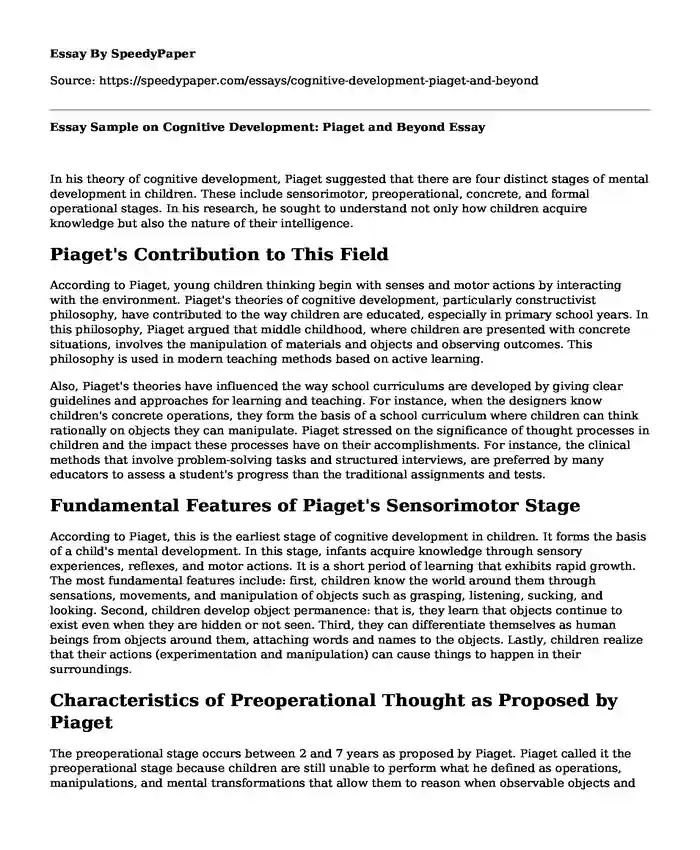
| Type of paper: | Course work |
| Categories: | Intelligence Child development Developmental psychology Cognitive development |
| Pages: | 3 |
| Wordcount: | 552 words |
In his theory of cognitive development, Piaget suggested that there are four distinct stages of mental development in children. These include sensorimotor, preoperational, concrete, and formal operational stages. In his research, he sought to understand not only how children acquire knowledge but also the nature of their intelligence.
Piaget's Contribution to This Field
According to Piaget, young children thinking begin with senses and motor actions by interacting with the environment. Piaget's theories of cognitive development, particularly constructivist philosophy, have contributed to the way children are educated, especially in primary school years. In this philosophy, Piaget argued that middle childhood, where children are presented with concrete situations, involves the manipulation of materials and objects and observing outcomes. This philosophy is used in modern teaching methods based on active learning.
Also, Piaget's theories have influenced the way school curriculums are developed by giving clear guidelines and approaches for learning and teaching. For instance, when the designers know children's concrete operations, they form the basis of a school curriculum where children can think rationally on objects they can manipulate. Piaget stressed on the significance of thought processes in children and the impact these processes have on their accomplishments. For instance, the clinical methods that involve problem-solving tasks and structured interviews, are preferred by many educators to assess a student's progress than the traditional assignments and tests.
Fundamental Features of Piaget's Sensorimotor Stage
According to Piaget, this is the earliest stage of cognitive development in children. It forms the basis of a child's mental development. In this stage, infants acquire knowledge through sensory experiences, reflexes, and motor actions. It is a short period of learning that exhibits rapid growth. The most fundamental features include: first, children know the world around them through sensations, movements, and manipulation of objects such as grasping, listening, sucking, and looking. Second, children develop object permanence: that is, they learn that objects continue to exist even when they are hidden or not seen. Third, they can differentiate themselves as human beings from objects around them, attaching words and names to the objects. Lastly, children realize that their actions (experimentation and manipulation) can cause things to happen in their surroundings.
Characteristics of Preoperational Thought as Proposed by Piaget
The preoperational stage occurs between 2 and 7 years as proposed by Piaget. Piaget called it the preoperational stage because children are still unable to perform what he defined as operations, manipulations, and mental transformations that allow them to reason when observable objects and events are absent. This adventure occurs when a child starts formal schooling. According to Piaget, the preoperational stage sees the emergence of language, although the sensorimotor stage lays the foundation for children to think symbolically, use pictures and words to represent objects. For Piaget, language is the most efficient form by which a child can manipulate the environment mentally with no constant or persistent recourse of physical objects. For instance, a train does not have to be a long vehicle a child sees at the station but also an object drawn in a book.
Second, at this stage, children are egocentric as they struggle to look at things in others' perspectives. They struggle in understanding logic or idea of constancy. Children learn through pretend play. Also, besides exhibiting development in thinking and language, children usually view and think about everything in concrete terms.
Cite this page
Essay Sample on Cognitive Development: Piaget and Beyond. (2023, Feb 08). Retrieved from https://speedypaper.net/essays/cognitive-development-piaget-and-beyond
Request Removal
If you are the original author of this essay and no longer wish to have it published on the SpeedyPaper website, please click below to request its removal:
- Friends of Life Essay Samples
- The Theme of Exploration and Nature, Essay Sample
- Free Essay on the Impact of 3D Printing on Global Logistics and Technology
- Women in Ancient and Classical Societies: Similarities and Differences - Paper Example
- Essay Example: Job-linked stress
- Systemic Racism and Social Justice Personal Reflection Example
- From Conformity to Liberation: The Evolution of American Women's Rights in the 1950s-70s - Essay Example
Popular categories




